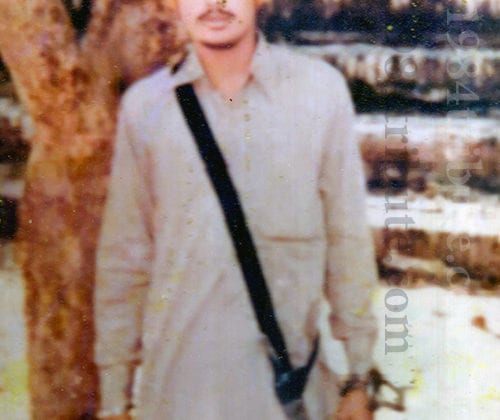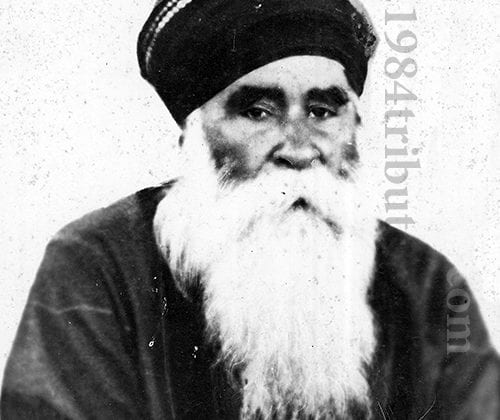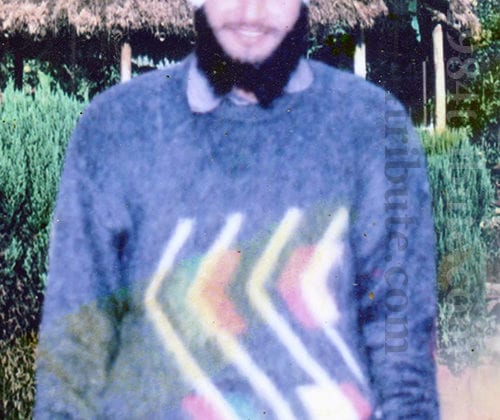Shaheed Bhai Palwinder Singh Burst
Shaheed Bhai Palwinder Singh Burst
Khalistan Commando Force
Bhai Palwinder Singh Burst was born in the house of Sardar Jagir Singh and from the womb of Mata Darshan Kaur, in the village of Khatrai Kalan near Ajnala. Bhai Sahib was the eldest sibling of 3 brothers and 2 sisters. Sardar Jagir Singh provided for his family by working in his farms. Bhai Sahib studied up to 8th class in the government school of his village. Bhai Sahib was of religious personality and always got involved in activities at his local Gurdwara. In 1982/ 83 Bhai Sahib was blessed with Amrit from the Panj Pyare at Johala Wala Gurdwara in Jalandhar. From the very beginning Bhai Sahib strictly followed the Sikh code of conduct.
In June 1984 the Indian army stormed Sri Harmandir Sahib with tanks and cannons, Bhai Sahib was of a very young age and the change that came after the attack of the Sikh throne also had an impact on Bhai Sahib’s life. After the attack, Bhai Sahib’s mind turned against the Indian government. As Bhai Sahib got older, he became a man of his word and a very well intellectual person. Following some of the rules set by Johala Wale Saints, Bhai Sahib was against television and would always tell his brothers and sisters to stop paying intention to government propaganda and pay attention to the reciting Waheguru.
After completing his studies, Bhai Sahib started learning tractor mechanics. For the first 2 years Bhai Sahib did his apprenticeship in Ajnala and the remaining 2 years Bhai Sahib moved to Chogwan with his Bhua and complete his apprenticeship there. Bhai Sahib took on many religious responsibilities, for example the local Gurdwara of Chogwan village did not have a Nishan Sahib, Bhai Sahib gathered Dasvandh from the locals and built a Nishan Sahib at the Gurdwara. It was selfless service like this that Bhai Sahib became highly respected and loved by locals. Bhai Sahib completed his apprenticeship after 4 years and started his business by opening a garage at the bus station of Fatehgarh on Churian Road in 1989. During this time the armed struggle for Khalistan was at its peak.
In Bhai Sahib’s area, Bhai Tarsem Singh of Teja Vahila village was active in Jhujaru activities. Bhai Sahib came in contact with Bhai Tarsem Singh and started doing Jhujaru actions in secret under the command of Khalistan Commando Force (Panjwar). Bhai Tarsem Singh later attained martyrdom along with other Jhujaru Singhs in a battle against the Indian security forces in Fatehgarh. After the martyrdom of Bhai Tarsem Singh, Bhai Sahib became more involved within the Sikh freedom movement. Another Jhujaru Singh from the Khatrai Kalan village was Bhai Major Singh who was also active in the area under Khalistan Commando Force. In 1990, Bhai Sahib joined Bhai Major Singh and started doing Jhujaru actions under his command.
Bhai Sahib completed any mission he was given by the higher command of Khalistan Commando Force with courage and bravery. Bhai Sahib was made the Khalistan Commando Force Area Commander of Ropar. Mata Darshan Kaur would say to Bhai Sahib not to leave home because the police force doesn’t spare anyone, but his reply would be, “Mother, don’t worry about me. A Sikh that recites the Gurbani of the Guru never feels pain. The little Sahibzade felt no pain at the time of their martyrdom.” Bhai Sahib would always give examples of sacrifices made for Sikhi. Once Bhai Sahib had fully joined the Sikh freedom movement, he never returned home. Bhai Sahib stayed and fought with Sikh principles while he fought in the armed struggle. Dur to Bhai Sahib’s family being poor, whenever they asked for money Bhai Sahib always replied by saying that the money belongs to the Sikh nation.
In his Jhujaru life Bhai Sahib did actions with brave Singhs such as, Bhai Major Singh (village Khatrai Kalan), Bhai Kulwinder Singh Chardikala (village Bathh, Ajnala), Bhai Swaran Singh Jahaj (village Sorian, Chogwan), Bhai Kabal Singh (village Dhandal, Ajnala), Bhai Paramjit Singh Fauji (village Sensra, Ajnala), Bhai Kabal Singh (village Bhindi Aulakh, Chogwan) and many more. For most of his Jhujaru life Bhai Sahib remained active in the Ropar and Mohali area. Due to the advancement of the Khalistan movement via Bhai Sahib, the Indian security forces had put 4 Lakh Rupees reward on his head.
Bhai Sahib was travelling towards the Ropar area in June 1990, due to some work for Khalistan Commando Force. Bhai Sahib had asked a young man to give him a lift on a bullet motorcycle. When motorcycle turned onto a main road, they saw a heavy presence of Punjab police and many checkpoints. Someone had informed the police about Bhai Sahib being in the area. The motorcycle passed many checkpoints but eventually they were stopped at one. Both Singhs were arrested and after questioning the young man with the motorcycle was released and Bhai Sahib was taken to CIA Staff. Bhai Sahib blindly tortured for information leading to other Jhujaru Singhs, but Bhai Sahib remained in high spirits and took on the torture as if he felt no pain. In the end, on 7th June 1991 Punjab police staged a fake encounter on a bridge near Chamkaur Sahib and made Bhai Palwinder Singh Burst a martyr of the Sikh nation.
When the news of Bhai Sahib’s martyrdom spread, the locals from the surrounding villages went to the police force of Ropar and demanded for Bhai Sahib’s body. The family were given the body and after the cremation, Bhai Sahib’s ashes were flown at Sri Kiratpur Sahib. After the martyrdom of Bhai Sahib, Ropar police chief Mohammed Mustafa said that Bhai Sahib was wanted for more than 100 murders in the Ropar, Amritsar and Majitha area.
Information given by the family of Shaheed Palwinder Singh Burst








